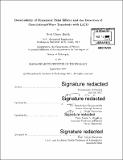| dc.contributor.advisor | Erotokritos Katsavounidis and Nevin N. Weinberg. | en_US |
| dc.contributor.author | Essick, Reed Clasey | en_US |
| dc.contributor.other | Massachusetts Institute of Technology. Department of Physics. | en_US |
| dc.date.accessioned | 2018-04-27T18:10:30Z | |
| dc.date.available | 2018-04-27T18:10:30Z | |
| dc.date.copyright | 2017 | en_US |
| dc.date.issued | 2017 | en_US |
| dc.identifier.uri | http://hdl.handle.net/1721.1/115024 | |
| dc.description | Thesis: Ph. D., Massachusetts Institute of Technology, Department of Physics, 2017. | en_US |
| dc.description | Cataloged from PDF version of thesis. | en_US |
| dc.description | Includes bibliographical references (pages 186-201). | en_US |
| dc.description.abstract | Dynamical tidal effects impact the orbital motion of extended bodies, imprinting themselves in several measurable ways. This thesis explores the saturation of weakly nonlinear dynamical tidal interactions within two very different systems: hot Jupiters orbiting main-sequence hosts with radiative cores and compact stellar remnants inspiraling due to gravitational radiation. In addition, it discusses general aspects of detecting Gravitational Waves with ground-based laser interferometers. Data quality and noise reduction along with source parameter estimation, with particular emphasis on localization, are discussed in great detail. Conclusions drawn from statistical ensembles of simulated signals are applied to the first three confirmed detections of Gravitational Waves, all from the coalescence of binary black hole systems. | en_US |
| dc.description.statementofresponsibility | by Reed Clasey Essick. | en_US |
| dc.format.extent | 201 pages | en_US |
| dc.language.iso | eng | en_US |
| dc.publisher | Massachusetts Institute of Technology | en_US |
| dc.rights | MIT theses are protected by copyright. They may be viewed, downloaded, or printed from this source but further reproduction or distribution in any format is prohibited without written permission. | en_US |
| dc.rights.uri | http://dspace.mit.edu/handle/1721.1/7582 | en_US |
| dc.subject | Physics. | en_US |
| dc.title | Detectability of dynamical tidal effects and the detection of gravitational-wave transients with LIGO | en_US |
| dc.type | Thesis | en_US |
| dc.description.degree | Ph. D. | en_US |
| dc.contributor.department | Massachusetts Institute of Technology. Department of Physics | |
| dc.identifier.oclc | 1031219120 | en_US |
